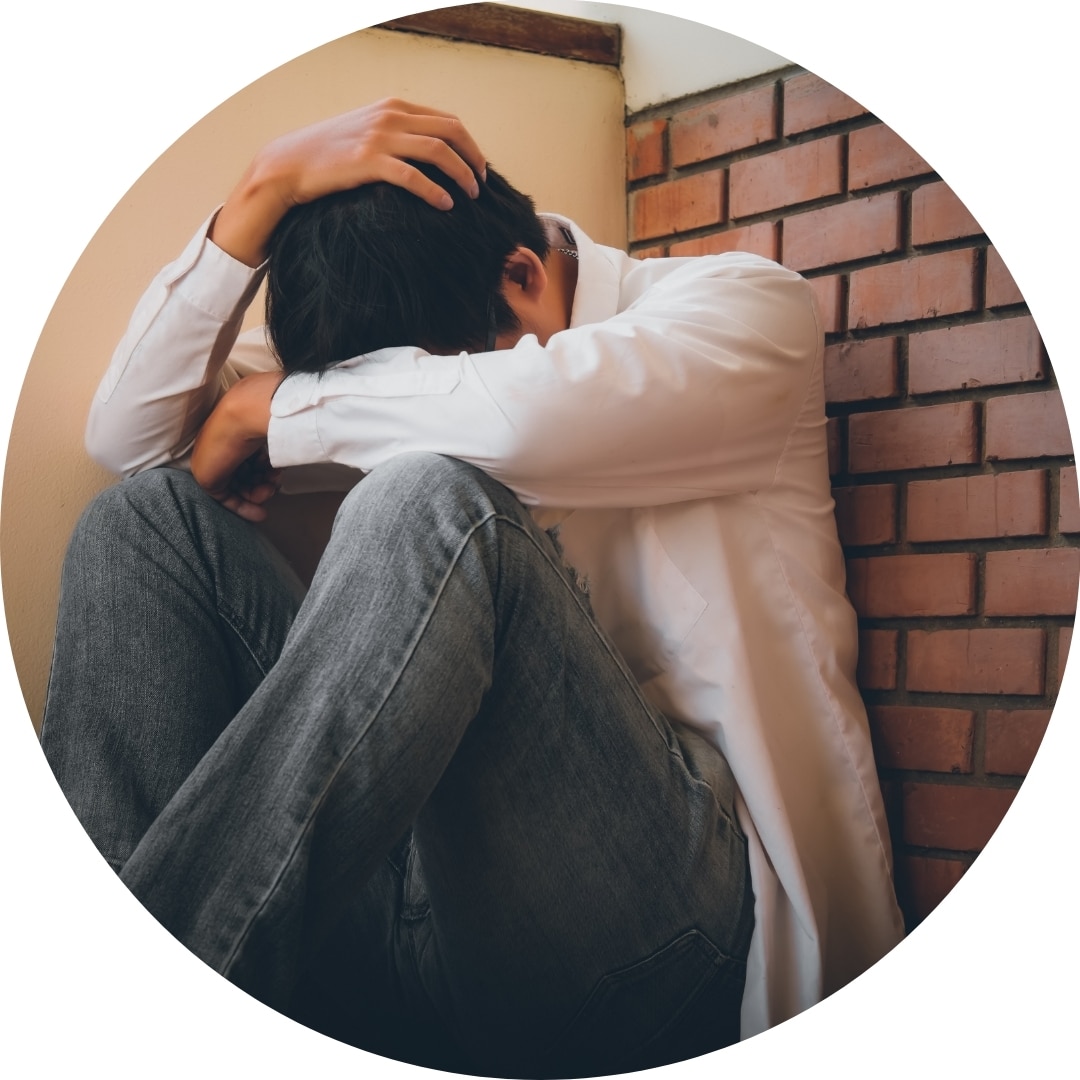Created in the 1930s by scientists, lysergic acid diethylamide (LSD), also commonly known as acid, is a potent hallucinogenic drug. The effects of acid often alter one’s perceptions, thoughts, and mood. A person using LSD might experience brighter colors, unusual shapes, and feel unusually excited or content with life. LSD (acid) abuse can take a toll on one’s mental and physical health. You may even be wondering, “Is acid addictive?” or, “Is LSD dangerous?”
One of the most serious concerns of LSD comes from having a “bad trip” or an extremely distressing experience with the drug. When this happens, a person may experience frightening perceptions, have impaired judgment, and be unable to think clearly. Learn more about LSD and how to get help if needed.
What Is LSD?
LSD is a human-made (synthetic) drug that comes from a chemical derived from ergot, which is a type of fungus that grows on the rye grain. Common street names for LSD include Mellow Yellow, window pane, white lightning, and sugar cubes.
LSD is classified by the U.S. Drug Enforcement Agency (DEA) as a Schedule 1 drug, meaning that it has no acceptable medical use and a high risk for abuse. It is currently illegal in the United States because of the chance of acid addiction.
How Does LSD Work?
LSD has a high affinity for serotonin, a brain neurotransmitter that controls mood, emotions, and sensory perception. Serotonin is known as the body’s “feel good” chemical because it contributes to feelings of happiness.
Researchers believe that LSD attaches to serotonin receptors in the brain. When a person takes LSD, it reacts with these receptors to trigger euphoria, produce hallucinogenic effects, and alter perception.

How Is LSD Used?
LSD is a colorless liquid or white crystalline powder. The pure form is very potent, so a tiny amount is often transferred onto something else, such as a small, thin square of blotter paper or gelatin chip (window pane). When the square or chip is placed on the tongue or swallowed, the drug is released into your system. LSD also comes in capsules, pills, or liquid.
Side Effects Of LSD
LSD, or lysergic acid diethylamide, is a powerful hallucinogenic drug that has been used for its mind-altering effects since the 1960s. While it may provide temporary feelings of euphoria and altered perceptions, LSD can also have serious side effects.
Physical side effects of LSD can include:
- Dilated pupils
- Headaches
- Fast or irregular heart rate
- Increased blood pressure
- Rapid breathing
- Dry mouth
- Chills and sweating
- Loss of appetite
- Nausea and vomiting
- Confusion
- Dizziness
- Weakness
- Insomnia
LSD can cause many perceptual and emotional side effects, such as:
- Bliss or euphoria
- A feeling of closeness to others
- A sense of greater mental clarity
- Visual, auditory, and tactile hallucinations (seeing, hearing, or feeling sensations that seem real but aren’t)
- Dissociation, derealization, and depersonalization (feeling of detachment from one’s thoughts, feelings, body, or reality at large)
- Distorted sense of time
- Impaired depth perception
- Impaired judgment
- Lowered inhibitions
- Difficulty concentrating
- Mood swings
The effects of LSD usually occur within 60 minutes of taking the drug and peak within four hours. They can last for nine to 12 hours.
LSD also carries a risk of a “bad trip” on LSD, which can include symptoms such as:
- Distress
- Confusion
- Intense fear
- Anxiety or panic attacks
- Paranoia
- Psychosis
- Dangerous behaviors or self-harm
While the initial effects of LSD may seem appealing to some, it is important to understand the potential risks and side effects associated with its use. Seeking professional help for substance abuse and addiction is crucial for those struggling with LSD abuse.
Long-Term Effects Of LSD
Some people who regularly use it may experience the following:
- Flashbacks (Hallucinogen Persisting Perception Disorder) – Flashbacks occur when a person re-experiences the effects of LSD long after it has worn off (even years later). Flashbacks may be in the form of involuntary perceptual distortions or visual hallucinations. Many people find them disturbing.
- Tolerance – Over time, a person can develop a tolerance to LSD, needing larger doses of the drug to achieve the same results. This can increase the risk of overdose.
What Factors Impact The Effects Of LSD?
The effects of LSD are called a “trip”. A trip can include both emotional and physical effects. Most of the time, the effects are pleasurable, but in some cases, a trip can be unpleasant.
LSD effects can vary widely from person to person and even on different occasions for the same person. Effects are impacted by:
- How often a person takes LSD
- How large of a dose was taken
- How it is taken
- A person’s age
- A person’s state of mind at the time they took LSD
The effects can be distressing and even dangerous if a person is not in a safe and controlled environment while under the influence of LSD.
Need Help For LSD & Acid Addiction?
Our admissions team is available around the clock to help you or a loved one get the help you need.
Dangers of Acid Addiction
One of the biggest dangers of LSD lies in the unpredictability of the “trip.” A person may experience a bad trip even if they take LSD in small doses. This can happen even if they have previously used LSD with no problem. A bad trip is similar to psychosis. It can include frightening hallucinations, distorted perceptions, and troubling thoughts. It can cause panic and paranoia. A person experiencing a bad trip may engage in harmful behaviors or violence.
A bad trip can be lengthy, lasting up to 24 hours in some cases. It can be dangerous if it worsens a pre-existing condition, like a heart problem, or if it causes unsafe behaviors like self-harm or running in traffic. Most LSD-related deaths occur from accidents or suicides that occur during a bad trip.
While LSD overdoses are very rare, severe physical effects can occur if it is taken at very high doses or mixed with other substances. These symptoms include:
- Tremors
- Seizures
- Coma
- Breathing problems or respiratory arrest
- Loss of consciousness
- Hyperthermia (dangerously high body temperature)
If you experience any of the above issues or witness them in someone else, call 911 or go to the nearest emergency room.
Treatment for LSD Abuse
If LSD use is causing problems in your life, reach out to a substance abuse professional to get help and gain control back. There are many evidence-based treatment options for LSD abuse, including inpatient and outpatient therapy.
There are no medications to specifically treat LSD abuse. However, doctors may prescribe certain medications to address flashbacks or HPPD symptoms, such as selective serotonin reuptake inhibitors (SSRIs). Other treatments include psychotherapies such as group therapy, cognitive behavioral therapy (CBT), and family therapy. Addiction experts recommend aftercare as a final step in treatment for LSD abuse. Aftercare can help you prevent relapses and learn coping skills to manage stress.
Does Insurance Cover LSD Addiction Treatment?
One of the most-asked questions when it comes to treating LSD addiction is whether or not insurance will cover the cost of treatment. If you’re wondering how to pay for rehab, the good news is that insurance can cover part or all of the cost of treatment. All insurance providers and policies are different, but a free insurance verification with the team at Vogue Recovery Center can offer more information about what treatment options for substance abuse and mental health issues you have available based on your policy.
Don’t hesitate to contact the admissions team at Vogue Recovery Center today and get started with your recovery journey! Don’t let acid addiction take your health and happiness away. The treatments for drug abuse at Vogue Recovery Center are safe and effective. The team is waiting and ready to help you get better.
Get Help For LSD Abuse and Addiction
If LSD addiction is a problem for you or a loved one, Vogue Recovery Center can help. We offer an extensive array of treatments, including detox, residential treatment, and outpatient programs, at our treatment centers in Los Angeles, Las Vegas, and Phoenix. Give us a call right now to schedule a free, private session with one of our admissions consultants. You deserve to live a life free from addiction.
- Hallucinogen Persisting Perception Disorder: Etiology, Clinical Features, and Therapeutic Perspectives – PMC
- LSD Toxicity – Medscape
- Suicidal cut‐throat wound during LSD intoxication – PMC
- Psychedelic and Dissociative Drugs | National Institute on Drug Abuse (NIDA)
- Serotonergic Psychedelic – an overview | ScienceDirect Topics

Medically Reviewed by Kelsey Jones, MS, LPC
















